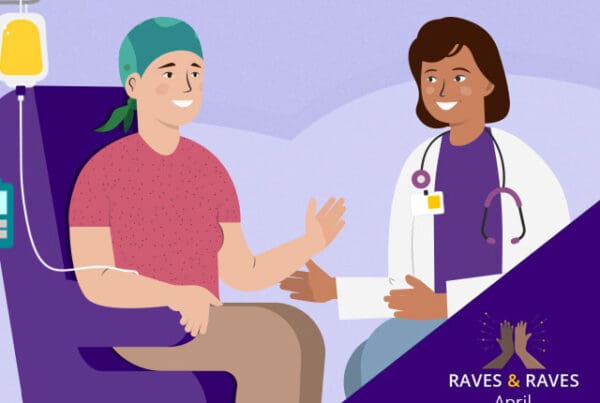Wednesday, March 9, is Registered Dietitian Nutritionist Day — a day to recognize our dietitian nutritionists here at UW Medicine for their work in research, education and clinical practice that helps improve the health of the public.
To celebrate, our dietitians share why they chose this career, favorite moments on the job and what they love to eat.
Karen Conger, MS, CD, RD, CDE, Harborview Medical Center
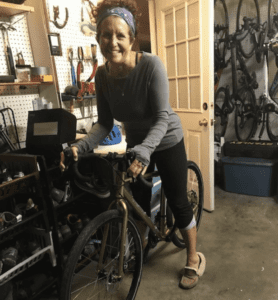
Why did you decide to become a dietitian nutritionist?
I decided to become a dietitian because this career is the perfect melding of science, food and talking to people.
What is your favorite thing about your job or a favorite memory from your job?
My favorite thing about my job is helping people to make lifestyle changes that help them improve their health while enjoying food.
What is your favorite meal and why?
This is a tough one! I love to cook so I am always experimenting with new recipes. My husband and I have a tradition of homemade pizza and movie nights that I look forward to and I also really enjoy trying to put together meals using what is in my fridge.
Any tips you’d give to people wanting to eat more nutritiously?
My biggest recommendation is to cook more!
Alison Evert, MS, RD, CDE, UW Medicine Primary Care
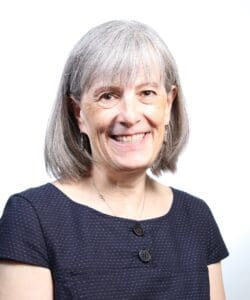
Why did you decide to become a dietitian?
I love science and I wanted to work in healthcare, and l also love to cook! It seemed like a perfect career. I definitely made the right choice as I’ve been a registered dietitian for 40 years.
What is your favorite thing about your job or a favorite memory from your job?
Having the opportunity to help people improve their health through their food choices. An old idea is enjoying a resurgence of attention today; it is quote from Hippocrates, “Let thy food be thy medicine and thy medicine be thy food.”
What is your favorite meal and why?
My favorite meal is anything that is prepared together with friends or family and shared together around the table.
Any tips you’d give to people wanting to eat more nutritiously?
The best strategy for long-term nutritional health is finding an eating plan that works for you. If you need help to make it happen, ask your primary care provider for a referral to a registered dietitian. At UW Medicine we practice evidence-based medicine. Research tells us that anyone desiring to make long-term behavior change needs on-going support. Our team of registered dietitians are here for you.
Courtney McCliment, RD, CDCES, Valley Medical Center
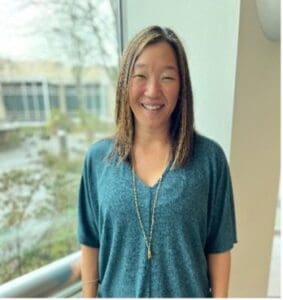
Why did you decide to become a dietitian nutritionist?
I became a dietitian because I love food! I love the power it has in bringing people together, providing comfort and sustaining health.
What is your favorite thing about your job or a favorite memory from your job?
The best reward in my job is witnessing people discover their natural ability and inspiration to improve their lives through healthier behaviors.
What is your favorite meal and why?
Honestly, my favorite meal is a cheeseburger and french fries! I don’t enjoy it often, but I REALLY enjoy it when I do! I love just about anything that involves beans, whole grains and/or quinoa.
Any tips you’d give to people wanting to eat more nutritiously?
Choose food that makes you feel good, gives you energy and supports you in doing the things you love. These days I believe people are allowing numbers (calories, macros) to define what is healthy. While nutrition data can be helpful along our journey, it shouldn’t be the only information used to determine the food that is best for you.
Susan Adams, MS, RD, UW Medical Center – Northwest
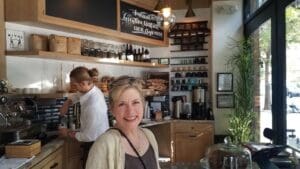
Why did you decide to become a dietitian nutritionist?
I grew up loving food and cooking. Those things are at the center of my being. My grandparents owned a restaurant in Yakima Valley and my mother was a food service manager who was a fantastic home cook as well. Science and math were my strengths in school, but I couldn’t imagine working in a field that only focused on a subset of those areas. Dietetics combines the art and culture of food with the science of nutrition and requires the ability to communicate complex science into practical food applications at home, in the kitchen and in choices made in the marketplace.
What is your favorite thing about your job or a favorite memory from your job?
I have had a fantastic career with so many varied experiences and wonderful memories. I began my career at Harborview, where I also interned. My work there focused on both clinical nutrition and nutrition support research for traumatized patients. I spent many years working in Raitt Hall on campus, teaching dietetic interns and later managing nutrition aspects of two different research grants. In one of those grants, my work focused on nutrition communications which led me to work with the local news media. As a result of that experience, I was selected as a volunteer media spokesperson for the Academy of Nutrition and Dietetics. During those three years I was interviewed by both print and broadcast reporters from all over the country.
One of my favorite positions was as an extension agent for WSU in King and Snohomish Counties, coordinating nutrition education programs for low-income families. I supervised a diverse staff of community-based educators and loved the opportunity to learn more about the food and people of a wide range of cultures. For several years, I taught an online food science lab for the UW’s Nutritional Sciences Graduate Program. Students conducted assigned research projects in their own kitchens, which ranged from very basic apartment kitchens to high end gourmet ones.
I anticipate retiring in about a year and have come full circle. For the past several years I’ve been a clinical dietitian at the UW Medical Center Northwest Campus. It’s been really fun to see how far this relatively new field has come in the more than four decades I’ve been practicing.
What is your favorite meal and why?
I could never limit myself to just one favorite meal! I love good food and I love cooking, so I have lots of choices. Those can range from standing at a cherry tree in my uncle’s Yakima orchard and eating as many perfectly ripe cherries as I could to eating a fine meal at the best restaurant I find in any city I travel to. My favorite food experiences, however, are when I invite family and friends over for a special meal — planning it for weeks; pulling a dozen or more cookbooks off the shelves to find the perfect recipes; cooking for days; and finally sitting around with my guests at a candlelit table, talking and laughing into the late evening. As I said, food and cooking are at the center of my universe.
Any tips you’d give to people wanting to eat more nutritiously?
Yes! The same tips I’ve given in many media interviews. Eat more fruits, vegetables and whole grains. Research first published in the 1980’s has been borne out for more than four decades. Diets high in fiber and the nutrients and phytonutrients found in fruits and vegetables are key to preventing many chronic diseases and leading to a longer and better quality of life.
Araceli Gutierrez, RD, CN, Valley Medical Center

Why did you decide to become a dietitian nutritionist?
I’ve always loved eating and talking about food! As I dove deeper into my studies as an undergrad, I became more interested in artificial nutrition support and how it can be used in acute and chronic disease.
What is your favorite thing about your job or a favorite memory from your job?
I love the variety of patients I get to work with on a daily basis and encountering different disease states. I am always learning something new!
What is your favorite meal and why?
Chicken mole with Mexican rice. Especially if it’s my mom’s. I appreciate the complexity of flavors and differences in preparation depending on who is making it.
Any tips you’d give to people wanting to eat more nutritiously?
Don’t try to change too much at once. Focus on one attainable, sustainable goal and build upon that. Also, eat more veggies!
Anni Huang, RD, Harborview Medical Center

Why did you decide to become a dietitian?
I wanted to become a nurse and was taking nursing prerequisites but was debating after hearing many nursing burn-out stories. At around the same time, I had a family member who underwent total gastrectomy and nutrition was especially important, which was also one of the contributing factors for me to become a dietitian.
What is your favorite thing about your job or a favorite memory from your job?
In my current role, I manage the hospital foodservice management system. My favorite thing about my job is that every day is different for me. It can be around improving processes surrounding patient and staff needs, supply chain issues, or technology needs/improvement to help with productivity and efficiency. My favorite memory was the day we migrated the hospital electric health record to Epic!
What is your favorite meal and why?
My favorite meal is breakfast because it is my quiet, calm time before the day starts. I believe how you start out your morning determines what your day is going to be.
Any tips you’d give to people wanting to eat more nutritiously?
Enjoy food! There are no good or bad foods. The important thing is to enjoy and everything in moderation. The worst enemy in healthy eating is abstaining from specific foods and ending up binge eating because you deprive yourself of it for a long time.
Kristi Peterson, RDN, CDCES, UW Medicine Primary Care
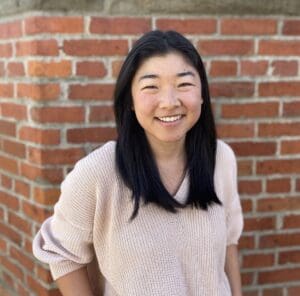
Why did you decide to become a dietitian?
I initially decided to study nutrition out of personal interest, and I knew I was on the right path because I loved the courses I was taking. Becoming a dietitian was the natural next step for me and I continue to stay in the field because I find it rewarding to help individuals and families understand how food can work for them.
What is your favorite thing about your job or a favorite memory from your job?
I love that in the Primary Care setting we get the gift of time with patients. Many people already have some idea of what “healthy” looks like and means to them, but they often haven’t given themselves the time and space to think about how to integrate those ideas into their own lives. Our visits are for exactly that — time to explore possibilities, obstacles, past experiences, taste preferences — to formulate a plan together that moves them from thinking about better health to achieving it.
What is your favorite meal and why?
Bacon Fried Rice, which consists of just three ingredients: bacon, soy sauce and rice (though it has since evolved to include whatever vegetables are left in the fridge). I love that this one can always be made in a pinch and without measurements or a recipe. It is also the first meal I ever learned how to cook for myself.
Any tips you’d give to people wanting to eat more nutritiously?
Don’t be afraid to season food, especially vegetables! Give yourself permission to eat and enjoy all foods. Let go of labels like “good” and “bad.” When all foods are an option, it quiets feelings of guilt and shame or the need for willpower and shifts the focus to enjoying food in a way that feels good for the body.
Tuesday Fohrman, RD, CD, CNSC, Valley Medical Center

Why did you decide to become a dietitian nutritionist?
I was diagnosed with Crohns disease at 19. Originally, I was working toward a degree in Vocal Performance but after my diagnosis, this pivotal moment in my life, my trajectory changed dramatically. I became more interested, both personally and intellectually, in how disease states can change nutritional status. From then on, I decided to change course and pursue nutrition and dietetics.
What is your favorite thing about your job or a favorite memory from your job?
I love how much nutrition is a part of everyday acute care. Whether it be counseling someone on a new diagnosis of diabetes to managing nutrition support, it’s an integral part of hospital care. We work hard every day to improve patient outcomes and bring out patients the best care by helping improve their nutritional status. It’s often an underappreciated job, but what keeps me here are my colleagues, staff and patients.
What is your favorite meal and why?
This is such a hard question! I LOVE food. I love how it brings people together, can introduce you to a new culture, can help people heal. But currently my favorite food/meal has been this Thai Coconut Curry Ramen recipe. It’s delicious and satisfying — especially on a cold winter night. I’ve also been loving dark chocolate peanut butter cups. YUM.
Any tips you’d give to people wanting to eat more nutritiously?
Try to make your plate colorful with lots of fruits and vegetables. Shop on the outside isles of the grocery store first and don’t shop hungry! Intuitive eating is key. This means listen to your body, let your mind/body be conscious of how the food makes you feel, and stop when you’re just full enough.
Cory Zenner, RD, UW Medical Center – Montlake

Why did you decide to become a dietitian nutritionist?
I’ve always been a very social person and initially I had wanted to work in public health or public relations — something where I could reach a large audience with health and wellness messaging. It was by chance that I enrolled in an introductory nutrition course and learned that my school had a program in dietetics. After that experience, I decided to pursue a career in healthcare rather than a public facing role and embraced the idea of becoming a clinician and educator. I’m reaching just as many people, but with a more personalized approach.
What is your favorite thing about your job or a favorite memory from your job?
I care for people living with advanced kidney disease and lung disease, both of which are incredibly complex for people to navigate. The most rewarding aspect of working with these populations is helping them to feel their best through simple diet modifications and reassuring them that their preferred foods will always have a place on the table. Patients often express a feeling of relief after meeting with me because they can take actionable steps right away that can make a difference to their health. It’s tangible to them. Food is powerful in that way, and I like being a part of that realization.
What is your favorite meal and why?
I’ve had an ongoing love affair with cheeseburgers since childhood and the way my mom makes them is still my favorite way to eat them: fried in a skillet with steamed buns. It’s one of the first foods I learned to cook and if I’m short on time, this is my trusty standby. To make it a meal, I add a side of roasted potatoes and asparagus cooked until just tender in the air fryer.
Any tips you’d give to people wanting to eat more nutritiously?
Small changes are the building blocks of lifestyle change. A healthful diet is about patterns over time. Rather than focusing on dietary restriction, aim for inclusion of more foods and more variety. I also recommend everyone take a closer look at how much sodium they’re consuming. Most Americans exceed the recommendation for less than 2,300 mg of sodium per day and about 80% of that excess is hidden in packaged foods that may not even taste salty! Start reading those labels just to see where you fall on the salt intake spectrum — even a modest reduction can improve blood pressure and reduce the chance of developing heart and kidney disease.
Lilly (Ge) Wang, RD, UW Medical Center – Northwest

Why did you decide to become a dietitian nutritionist?
I always loved cooking and good food. As a student, I knew I wanted to work in the medical field. So, I chose nutrition so that I can teach people how to be healthful through eating well.
What is your favorite thing about your job or a favorite memory from your job?
The favorite thing about my job is working as a member of the ICU acute care team. I get to work alongside members from different disciplines, learn about many different aspects of the patient’s care and also am recognized and respected for my specialty in nutrition.
What is your favorite meal and why?
My favorite meal is a spicy cold rice noodle dish originated from my hometown Xi’an, China. It is a thick rice noodle covered in aromatic vinaigrette and chili oil. I grew up eating this dish and can never forget the taste of it. I have not tasted the dish in its authentic form for years, so the craving really grew stronger with time. I think it represents a sense of home to me.
Any tips you’d give to people wanting to eat more nutritiously?
My tip for everyone is: food is a vital part of life, something to enjoy. I would love everyone to think more about how to cook, enjoy food and have a good relationship with food, instead of following any diet that is overly restrictive and makes you feel bad about yourself.
Mary Walton, RD, CDCES, Valley Medical Center
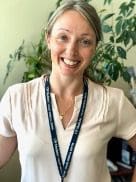
Why did you decide to become a dietitian nutritionist?
Poor health appeared to be the cause of much suffering. Nutrition appeared to be a practical way to help others lead a healthier life.
What is your favorite thing about your job or a favorite memory from your job?
Helping others understand food through the complexity of their illness. Witnessing them as they find trust in their body cues and the freedom to enjoy delicious food!
What is your favorite meal and why?
This changes by the week. As for flavor pairings, this week I am enjoying the simplicity of daikon radish with fresh oranges. Fresh, crisp, juicy and a pleasant blend of sweet, tart and bitter.
Any tips you’d give to people wanting to eat more nutritiously?
Start with regular mealtimes full of nutrient rich foods. Can you put a fresh spin on a food you crave? Can you add veggies to the main dish or a salad next to it? If you’re left unsatisfied and craving treats, try having a healthful snack in between meals and drink plenty of water.
Making health changes isn’t just about “taking away” what’s pleasurable. I find that people often have the most long-lasting success with their health when we work on “adding” quality, creative choice and vitality to their plate, and their life.
Editor’s note: Responses were lightly edited for length, clarity and style.
Photo Caption: Photo by Lily Banse on Unsplash

